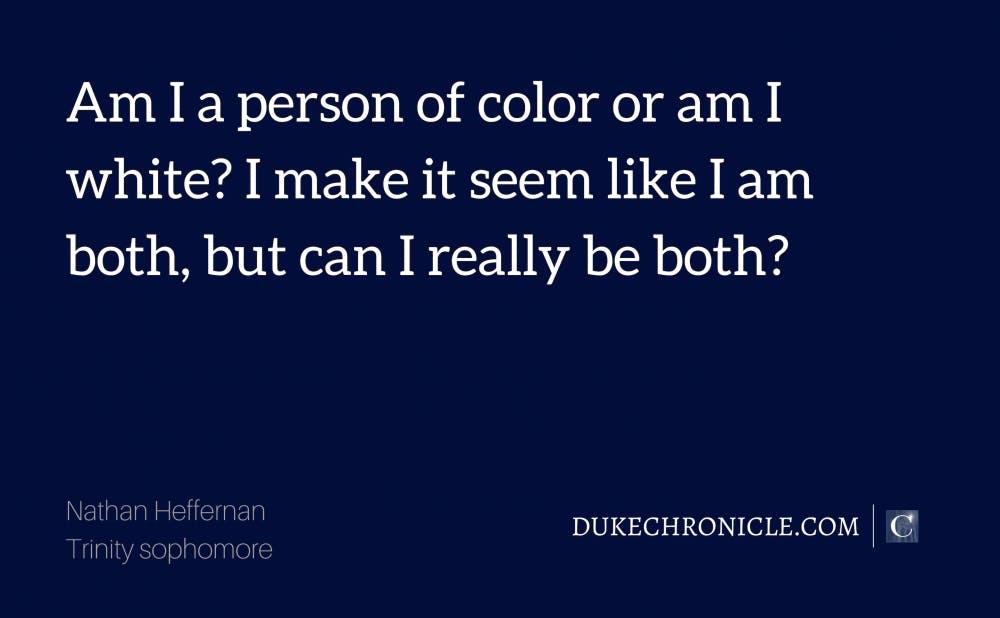When it comes to identity, I can frame myself two radically different ways: I am a gay person of color on a large amount of financial aid, and I am a white male legacy student at Duke. Both descriptions are technically accurate, but fail to illustrate the nuances of my competing identities. As a half-white half-Asian, or a “one chopstick,” my racial identity has remained inconsistent to myself and others. I feel like I fluctuate between being white and Korean depending on the scenario or group of people I am around. In college, we are often engaged in discussions about identity and privilege, and I have struggled to pinpoint my place in such conversations.
Before I can quantify my privilege, I need to clarify my identity. Am I a person of color or am I white? I make it seem like I am both, but can I really be both? I am not white-passing, meaning I do not appear to be white to the standard viewer. Since race is often defined by others’ perception of you, I would have to be white-passing to be white. For that reason, I tend to label myself as a person of color in most situations and then add on that I am half-white. But it feels ridiculous to call myself half-white since being white in America is to lack an identifiable race. In the eyes of others, I do not look white at first glance, and thus I am not white.
However, although I am not clearly white, I am not clearly Asian either. Many people assume I am Asian at first, but even then, they are not completely sure. My East-Asian features are toned down and my ambiguity prevents others from categorizing me immediately as Asian. This keeps me detached from the numerous stereotypes of Asian-Americans that strip them of their individuality. My half-whiteness gives me privilege in that sense, without me even being “white.” Half-white half-Asians as a whole benefit from meeting Western beauty standards while still retaining the Asian identity.
In discussions of identity and privilege, I feel a great deal of freedom to discuss my beliefs after I have identified myself as a POC. The label of POC for me feels like a badge of honor that I am abusing, as I have not experienced the oppression that my Black and brown peers have felt. I am granted the freedom to articulate my opinions on race in a way I would not be able if I were completely white. Discussions about identity often set a bold line between POC and white, causing us to ignore the vast differences in privilege of certain groups within the POC umbrella. Additionally, it misses out an opportunity to explore the specific experiences of mixed-raced individuals, and think critically about the differences in forms of privilege.
My privileges from being white are extremely clear for me. Having a white father who went to Duke gave me enormous benefits in education and possibly aided my acceptance into Duke. Even without attending a fancy private high school or having an application advisor, I still had a leg-up just by having a parent who went to an elite institution. Duke never felt like something out of reach, and that gave me a sense of entitlement.
On the flip-side, my appearance as semi-Asian has kept me from being a part of the same white society as my father. I didn’t really feel Asian as a child since my mom was fairly assimilated and a concept of race hadn’t formed for me yet. But as I grew up, other people constantly reminded me that I looked Asian through comments and jokes, until I eventually saw myself as Asian. Through this I began to feel like a minority and my worldviews were shaped by that perspective. But even though I look and feel like a marginalized individual, I need to recognize the hidden elements of privilege that influence my life.
My hidden privilege doesn’t just stop at being half-white. As I casually dropped earlier, I identify as gay, a label that has historically been treated with intense discrimination. It would be easy for me to “play the gay card” in a discussion about identity and lament how awful my childhood was, but that would ignore the privilege I have as a fairly masculine-presenting male. People often describe me as a “leader” and my authority is rarely questioned, which would be complicated if I was more feminine-presenting. Much of still-rampant homophobia is directed toward gay men who “seem feminine,” and I need to recognize that my appearance alleviates much of that.
So, while I can check these boxes of “POC” and “gay,” my actual life is much more nuanced, as it probably is for many other people. Being half-white hasn’t given me exactly half the privilege of a white person, but it has given me privilege in certain areas and has made less of an effect in others. There remain a lot of people who don’t fully believe in the massive effects of white privilege, or roll their eyes when they hear the term. As someone who has been treated as both white and non-white at different times in my life, I can assure skeptics that white privilege exists. And even though privilege is complex and varied depending on one’s other identities, any amount of white in this society benefits you.
Nathan Heffernan is a Trinity sophomore. His column runs on alternate Tuesdays.
Get The Chronicle straight to your inbox
Sign up for our weekly newsletter. Cancel at any time.

